
Gary Anthony James Webb, known professionally as Gary Numan, is an English musician. He entered the music industry as frontman of the new wave band Tubeway Army. After releasing two studio albums with the band, he released his debut solo studio album The Pleasure Principle in 1979, topping the UK Albums Chart. While his commercial popularity peaked in the late 1970s and early 1980s with hits including "Are 'Friends' Electric?" and "Cars", Numan maintains a cult following. He has sold over 10 million records.

Tubeway Army were a London-based new wave band led by lead singer Gary Numan. Formed at the height of punk rock in 1977 the band gradually changed to an electronic sound. They were the first band of the electronic era to have a synthesiser-based number-one hit, with their single "Are 'Friends' Electric?" and its parent album Replicas both topping the UK charts in mid-1979. After its release, Numan opted to drop the Tubeway Army name and release music under his own name as he was the sole songwriter, producer and public face of the band, but he retained the musicians from Tubeway Army as his backing band.
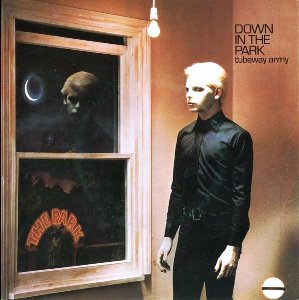
"Down in the Park" is a 1979 song by the English band Tubeway Army, featuring lead vocals by Gary Numan. It was released as the first single from the band's second album Replicas, though was not a hit. The song was written and produced by the band's frontman Gary Numan, and despite its lack of commercial success, has been performed by Numan regularly in his live shows throughout the years.

"Are 'Friends' Electric?" is a 1979 song by the English band Tubeway Army. Taken from their album Replicas, it was released as a single in May 1979 and reached number one in the UK Singles Chart, staying there for four weeks. It was written and produced by Gary Numan, the band's frontman and lead vocalist. It was also the band's last single before breaking up.

Dance is the third solo studio album by English new wave musician Gary Numan, released on 4 September 1981 by Beggars Banquet Records. It was the first studio album Numan released after his "Farewell Concerts" staged at Wembley Arena.

Replicas is the second and final studio album by the English new wave band Tubeway Army, released on 4 April 1979 by Beggars Banquet Records. It followed their self-titled debut from the previous year. After this, Tubeway Army frontman Gary Numan would continue to release records under his own name, though the musicians in Tubeway Army would continue to work with him for some time. Replicas was the first album of what Numan later termed the "machine" phase of his career, preceding The Pleasure Principle (1979) and Telekon (1980), a collection linked by common themes of a dystopian science fiction future and transmutation of man/machine, coupled with an androgynous image and a synthetic rock sound.
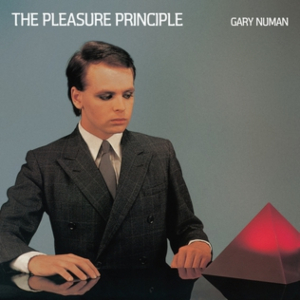
The Pleasure Principle is the debut solo studio album by English new wave musician Gary Numan, released on 7 September 1979 by Beggars Banquet Records. The album came about six months after Replicas (1979), his second and final studio album with the band Tubeway Army. The Pleasure Principle peaked at No. 1 on the UK Albums Chart.
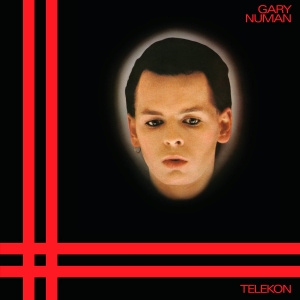
Telekon is the second solo studio album by English musician Gary Numan. It debuted at the top of the UK Albums Chart in September 1980, making it his third consecutive No. 1 album. It was also the third and final studio release of what Numan retrospectively termed the "machine" section of his career, following Replicas and The Pleasure Principle.

"We Are Glass" is a song by the British singer Gary Numan. It was released as a single in May 1980 and reached number five on the UK Singles Chart.

"I Die: You Die" is a song by the British musician Gary Numan, released as a single in August 1980. Released shortly before his fourth album, Telekon, it continued the anthemic style Numan had begun earlier in the year with "We Are Glass". The composer himself described the two singles as "Much the same thing. Both very chorus-orientated with the guitars as the main rhythmic device and the keyboards tinkling over the top".

Tubeway Army is the debut album by Tubeway Army, released in 1978. Its initial limited-edition run of 5,000 sold out but did not chart. When reissued in mid-1979, following the success of the follow-up Replicas (1979), the more commonly known cover art featuring a stylised portrait of Gary Numan was introduced. This release made No. 14 in the UK album charts.
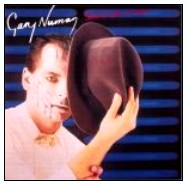
"She’s Got Claws" is a 1981 song by Gary Numan. It was the first and only single released from his 1981 album Dance. The song signalled a different musical style for Numan, featuring jazz-influenced saxophone and fretless bass, as well as a new image comprising trilby hat and pinstriped suit, inspired by Humphrey Bogart and Howard Hughes.

"Bombers" is the second single by Tubeway Army, released in 1978.

"That's Too Bad" is the debut single by Tubeway Army, the band which provided the initial musical vehicle for Gary Numan. It was released in February 1978 by independent London record label Beggars Banquet. On the day of its release, Numan quit his job in a warehouse to become a professional musician.
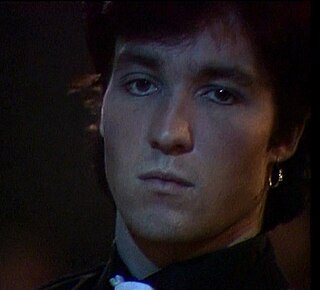
Paul Andrew Gardiner was a British musician who played bass guitar with Gary Numan and Tubeway Army, as well as creating material under his own name.

Magic Windows is the thirty-second album by jazz pianist Herbie Hancock, released on September 29, 1981, on Columbia. This album continues his collaboration with associate producer Jeffrey Cohen, who co-wrote four of the tracks on the album. Additionally, the track "Satisfied with Love" was co-written by his sister, Jean Hancock. Musicians involved in this album include guitarists Wah-Wah Watson, Ray Parker Jr. and Adrian Belew, vocalist Sylvester and percussionists Sheila E. and Paulinho da Costa.

I, Assassin is the fourth solo studio album by English new wave musician Gary Numan, released on 10 September 1982 by Beggars Banquet. It peaked at No. 8 on the UK Album Chart. Three singles were released from the album: "Music for Chameleons", "We Take Mystery " and "White Boys and Heroes", all of which reached the UK Top 20.

New Man Numan: The Best of Gary Numan is a compilation album released on the T.V. Records label in 1982 of songs featuring Gary Numan. The album reached number 45 on the UK Albums Chart.

Dark Light is a live album by English musician Gary Numan. The album was released in June 1995 in the United Kingdom. The album was not released in the United States until August 1998. In April 2003 the album was remastered and reissued. The album was recorded at Numan's concert at Labatt's Hammersmith Apollo in London on 12 November 1994 during his Sacrifice Tour. The album reached number 107 on the UK Albums Chart.

The Premier Hits is a compilation album by Gary Numan released in March 1996 on the Polygram TV record label. The album reached No 21 in the UK Albums Chart, leaving the chart after three weeks. It currently stands as the best selling compilation by Gary Numan. The album was promoted by the re-released 1987 remixed version of "Cars", re-titled as the 'Premier Mix' in a TV advert campaign for Carling Premier lager. The single reached No 17, making the third time that "Cars" has reached the top 40 in the UK Singles Chart.




















